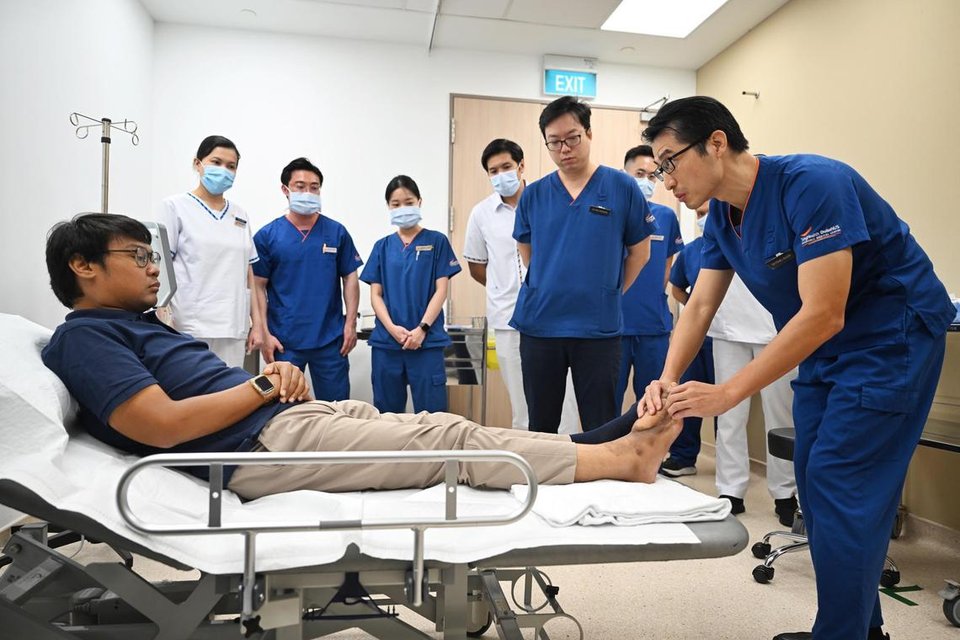‘Don’t rob them of their independence’: Helping patients design life around dementia

Published on
21 Sep 2022
Published by
The Straits Times
SINGAPORE – Madam Leong Seow Kheun likes to start the day with a morning walk.
“I still have stamina,” says the 87-year-old housewife, who has Alzheimer’s disease and short-term memory loss.
She navigates her Ang Mo Kio flat with the help of large-print labels marking her room, the toilet and also the contents of her bedside furniture.
Madam Leong used to live with her husband, retired architectural draftsman Chia Pak Khong, also 87. He has vascular dementia and recently moved to a nursing home when his condition deteriorated.
Until April this year, however, the couple managed to live relatively independently with a helper, thanks to routines set up by their daughter, 62-year-old Chia Cheng Yee.
Madam Chia installed dementia-friendly features in their flat, such as a shelf of photos to jog memories, and a daily pill dispenser so they would take the right amount of medication at the right time. “Initially, I set reminders on their phone with my voice, but they would still get confused,” she says.
Dementia is an umbrella term for neurological conditions that lead to a decline in cognitive function and affect activities of daily living. Dementia is not a natural consequence of ageing, but older people and those with chronic diseases are at higher risk of developing dementia.
In Singapore, one in 10 people aged 60 and older has dementia, according to a 2019 report from the Ministry of Health. The National Neuroscience Institute also reports an increase in cases with young onset dementia, a term used when people below 65 develop it.
The Covid-19 pandemic also worsened the condition of many with dementia, say experts like Dr Rachel Cheong, consultant, geriatric medicine, at Khoo Teck Puat Hospital (KTPH).
Movement restrictions interrupted daycare services and other interventions meant to stabilise their condition.
“The lack of physical activity meant a lot of persons with dementia had drastic deterioration in terms of cognitive function and physical activity,” she adds.
The statistics are of concern, but a number of grassroots and state-led efforts are ongoing to create safe, welcoming dementia-friendly communities around the island.
However, medical experts and social workers say it is important to involve more persons with dementia in service planning, especially those in the early stages, who can hopefully slow their decline with interventions such as cognitive stimulation, medication and exercise.
Key names in the push to raise awareness of and support for dementia are the state-funded Agency for Integrated Care (AIC), which brings together community support organisations around Singapore; and the non-profit Dementia Singapore, which works with hospitals, caregivers and community organisations.
Mr Jason Foo, chief executive of Dementia Singapore, says the goal is to allow people with dementia to stay in their homes and familiar surroundings for as long as possible. Persons with dementia thrive on routine and feelings of safety.
One should not underestimate a person with dementia, he adds. “We look at the abilities they still have and work on these to make sure they feel able to carry on. They can still do a lot of things, and when we reinforce that, the person with dementia feels better.”
Madam Chia agrees and it is why she researched ways to allow her parents to stay at home for as long as possible.
She put together games for them to play together for cognitive stimulation. Her mother also attends a daycare centre run by social service agency Awwa, where she participates in exercises and musical activities and meets neighbours.
Mr Foo says: “It’s important for persons with dementia to go out and mix with people. If they stay at home, they may feel irritated and restless.”
What about those who are homebodies? Madam Chia’s father preferred to watch videos on his computer at home until his recent physical decline. He was also focused on caring for his wife.
This led to a problem when Madam Leong complained regularly about body aches and pain. Mr Chia would buy over-the-counter medication for her and she would take too much without realising it. Their daughter, who monitored the couple via CCTV, says her parents would finish a pack of 20 tablets within three days.
To counter this, Madam Chia bought placebo medication – sweets – that come in the same packaging as over-the-counter medication. She also explained her mother’s condition to their general practitioner, with the help of a social worker. “Such micromanaging is required,” she says.
There is increasing awareness of dementia and fund raising to support dementia services. Last Friday, SPH Radio station ONE FM 91.3’s Greatest Hits Of All Time Charity Concert raised $25,000 for Dementia Singapore from ticket sales.
However, more is needed in terms of soft skills, including sensitising people on how to deal with neighbours and customers who have dementia.
For example, staff at transport nodes are being trained on how to manage commuters with dementia. People who appear to be lost can be taken to Dementia Go-To points at passenger service counters of bus interchanges and MRT stations. This service launched in February under the Dementia-Friendly Singapore initiative supported by AIC.
There are also wayfinding projects at transport nodes and Housing Board blocks, where murals, colour-coding and signs make directions clearer. These projects are often carried out in consultation with persons with dementia.
Dr Cheong from KTPH notes that it is important to ask persons with dementia for their opinions about their care and everyday life, and to integrate more of such feedback into plans for making Singapore more dementia-friendly.
“There should be more involvement of persons with dementia in service planning since this is meant to be for their benefit,” she says.
To help people with dementia reside at home for as long as possible, KTPH has a helpline for caregivers to call with questions about medication or how to manage their loved ones’ behavioural issues.
Assistant nurse clinician Fazila Nijal, who answers these calls, can get from five requests a day to 80 calls and messages a week. Most are from caregivers seeking reassurance or help.
Her advice is to implement the same attitude that nurses like her take with patients who have dementia.
“We tell caregivers to not rob the person of his or her independence. Do not take over his or her tasks, but support the person with dementia when he or she does the task,” she says.
“See the person living with dementia as a person. They are still with us, their life story and their personality matters. They are still the person they were, but extra support is required. Reach out to us for help.”
Source: The Straits Times © Singapore Press Holdings Limited. Reproduced with permission.
ALL views, content, information and/or materials expressed / presented by any third party apart from Council For Third Age, belong strictly to such third party. Any such third party views, content, information and/or materials provided herein are for convenience and/or general information purposes only. Council For Third Age shall not be responsible nor liable for any injury, loss or damage whatsoever arising directly or indirectly howsoever in connection with or as a result of any person accessing or acting on any such views, content, information and/or materials. Such third party views, content, information and/or materials do not imply and shall not be construed as a representation, warranty, endorsement and/or verification by Council For Third Age in respect of such views, content, information and/or materials.







